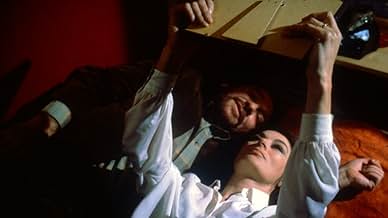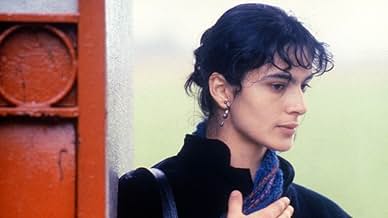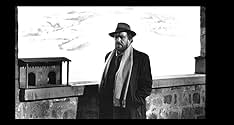Die Tragödie eines lächerlichen Mannes
Originaltitel: La tragedia di un uomo ridicolo
IMDb-BEWERTUNG
6,6/10
1210
IHRE BEWERTUNG
Füge eine Handlung in deiner Sprache hinzuAn Italian businessman decides whether to pay a ransom for his abducted son or not.An Italian businessman decides whether to pay a ransom for his abducted son or not.An Italian businessman decides whether to pay a ransom for his abducted son or not.
- Regie
- Drehbuch
- Hauptbesetzung
- Auszeichnungen
- 3 Gewinne & 2 Nominierungen insgesamt
Anouk Aimée
- Barbara Spaggiari
- (as Anouk Aimee)
Ricky Tognazzi
- Giovanni Spaggiari
- (as Riccardo Tognazzi)
Don Backy
- Crossing Keeper
- (Nicht genannt)
Omero Capanna
- Car Driver
- (Nicht genannt)
Cosimo Cinieri
- Magistrate
- (Nicht genannt)
Empfohlene Bewertungen
10AXP_918
A decade after the worldwide success of LAST TANGO and a half-dozen years following his ambitious failure NOVECENTO (1900), Bernardo Bertolucci makes his most restrained, workmanlike and nuanced film.
There's nothing as stylish as there is in his great film THE CONFORMIST, there's no Marlon Brando as the last American in Paris as there is in TANGO, there's only a wholly-realized work, full of quiet daring.
Ugo Tognazzi, a veteran of Italian film and theater, is Primo Spaggiari, a cheese factory owner in Northern Italy, who accidentally witnesses the kidnapping of his only son.
Flanked by his glamorous French wife, played by the accomplished Anouk Aimee, his son's radical, sexy girlfriend, played by the talented Laura Morante, and a priest who seems capable of anything, actor Victor Cavallo... the drama unfolds. A cloud of mystery hangs over the autumnal landscape. A director who made his career an Oedipal quest in search of the father, now turns his gaze around... the father searches for his son.
Bertolucci, working with his actors and aided by veteran cinematographer Carlo Di Palma, who made his name working with Michelangelo Antonioni (RED DESERT and BLOW-UP), transforms the countryside of Emilia (where he's from) and the estate with the factory, into a vast theater of contemporary Greek tragedy. The stunning shot of large cheese wheels in the factory refrigerator that Spaggiari refers to as his "Fort Knox," Spaggiari's bicycle ride across the city of Parma that is a small time capsule of postwar Italian cinema and the beguiling ending are scenes that, alone, would make this film worth seeing.
I've watched this film a number of times at repertory cinemas, on television, and on old VHS. It grows with each viewing. Something new to see or discover every time I watch it and WATCHING is one of the various themes of this film. It's a major crime that such a film is not on DVD or Blu ray in North America.
A hearty thank you to Bertolucci for this superb work, his most underrated film.
There's nothing as stylish as there is in his great film THE CONFORMIST, there's no Marlon Brando as the last American in Paris as there is in TANGO, there's only a wholly-realized work, full of quiet daring.
Ugo Tognazzi, a veteran of Italian film and theater, is Primo Spaggiari, a cheese factory owner in Northern Italy, who accidentally witnesses the kidnapping of his only son.
Flanked by his glamorous French wife, played by the accomplished Anouk Aimee, his son's radical, sexy girlfriend, played by the talented Laura Morante, and a priest who seems capable of anything, actor Victor Cavallo... the drama unfolds. A cloud of mystery hangs over the autumnal landscape. A director who made his career an Oedipal quest in search of the father, now turns his gaze around... the father searches for his son.
Bertolucci, working with his actors and aided by veteran cinematographer Carlo Di Palma, who made his name working with Michelangelo Antonioni (RED DESERT and BLOW-UP), transforms the countryside of Emilia (where he's from) and the estate with the factory, into a vast theater of contemporary Greek tragedy. The stunning shot of large cheese wheels in the factory refrigerator that Spaggiari refers to as his "Fort Knox," Spaggiari's bicycle ride across the city of Parma that is a small time capsule of postwar Italian cinema and the beguiling ending are scenes that, alone, would make this film worth seeing.
I've watched this film a number of times at repertory cinemas, on television, and on old VHS. It grows with each viewing. Something new to see or discover every time I watch it and WATCHING is one of the various themes of this film. It's a major crime that such a film is not on DVD or Blu ray in North America.
A hearty thank you to Bertolucci for this superb work, his most underrated film.
I see this film in straight connection with La Strategia del ragno also directed by Bertolucci 11 years before this one. Only with characters inversion, meaning that in this one the father goes along find out things about his son, hidden things, beyond what he looked like. In the 1970 film it is the son who finds out the life of his late father, his hidden secrets. Still I found the older movie much more appealing, in terms of the plot itself but also in terms of the direction also. It is obvious that a good plot estimulates direction but still this one could have been better. It has from times to times the quality seal from Bertolucci, but in general it's not as good as others. The end is very delayed, the film could have less 20 minutes that it would be better to watch. Some beautiful images along the time, as usual in Bertolucci, but than again somewhat meaningless as they are not many times in the context of the story.
Though the film touches some important issues, such as terrorism in Italy's 1980'. Also interesting in exploring how a man can 'use the blood' of his own son just to get himself out of a difficult financial position. Not much more than this. It's worth watching if you like Bertolucci or if you have special interest in italian cinema. But don't judge the director just on this one. It is unfair, specially if we think that his second film after this one was The Last Emperor...
Though the film touches some important issues, such as terrorism in Italy's 1980'. Also interesting in exploring how a man can 'use the blood' of his own son just to get himself out of a difficult financial position. Not much more than this. It's worth watching if you like Bertolucci or if you have special interest in italian cinema. But don't judge the director just on this one. It is unfair, specially if we think that his second film after this one was The Last Emperor...
Well acted by Ugo Tognanzzi as a self made cheese factory owner whose son is apparently kidnapped, although we can see there's a real possibility the kidnapping was staged so the son could raise money for left-wing causes he supports. Most of the film is about Tognazzi dealing with the kidnapping by pondering selling his factory, and getting to know two go betweens who may or may not have there own agendas (the son's girlfriend, and a leftist sort-of priest), as well as dealing with his wife, Anouk Aimee, who is far more anxious to sell everything they own to pay the kidnappers than the more cynical and wily Tognazzi.
What was hard for me was that, unlike it's spiritual forerunner "The Spider's Strategem", the more satirical, lighter-toned edge seems to work against the drama and vice versa. None-the- less this is interesting and thought provoking. And if not among Bertolucci's greatest works, still well worth seeing.
What was hard for me was that, unlike it's spiritual forerunner "The Spider's Strategem", the more satirical, lighter-toned edge seems to work against the drama and vice versa. None-the- less this is interesting and thought provoking. And if not among Bertolucci's greatest works, still well worth seeing.
Primo Spaggiari (Ugo Tognazzi) is a wealthy cheese manufacturer (from Parma of all places) whose son is kidnapped in front of him in broad daylight. Not knowing whether his son is alive or dead Primo sees the incident as an opportunity to save his financially struggling cheese factory, with his son acting as 'fertiliser'. Deservedly one of writer/director Bernardo Bertolucci's least known feature films (although Tognazzi - who looks like Anthony Quinn in this film - won an award at Cannes in 1981 for his performance), this is an overlong dry comedy, with a rambling and at times discombobulating storyline (courtesy of either loopy dialogue, or dodgy subtitles, or a mixture of both), and a central ambiguity at it's heart over the role of the kidnapping 'victim' (a scam?). What helps pass the time?
Wusstest du schon
- WissenswertesLast movie of actor Renato Salvatori.
- Zitate
[repeated line]
Primo Spaggiari: I gotta tell her.
- VerbindungenReferenced in Maniac 2 - Love to Kill (1982)
- SoundtracksRock'n Roll Is Good For The Soul
Performed by The Boppers
Top-Auswahl
Melde dich zum Bewerten an und greife auf die Watchlist für personalisierte Empfehlungen zu.
- How long is Tragedy of a Ridiculous Man?Powered by Alexa
Details
- Erscheinungsdatum
- Herkunftsland
- Sprache
- Auch bekannt als
- Tragedy of a Ridiculous Man
- Drehorte
- Produktionsfirma
- Weitere beteiligte Unternehmen bei IMDbPro anzeigen
- Laufzeit1 Stunde 56 Minuten
- Sound-Mix
- Seitenverhältnis
- 1.66 : 1
Zu dieser Seite beitragen
Bearbeitung vorschlagen oder fehlenden Inhalt hinzufügen

Oberste Lücke
By what name was Die Tragödie eines lächerlichen Mannes (1981) officially released in Canada in English?
Antwort

























